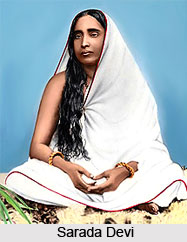 Sri Sarada Devi, also known as the `Holy Mother`, is the spiritual consort of Sri Ramakrishna. She was born on 22 December 1853 in Jayrambati, a village adjoining Kamarpukur in West Bengal. Her father, Ramachandra Mukhopadhyay, was a pious and kind-hearted person, and her mother, Shyama Sundari Devi, was a loving and hard-working woman. During the terrible famine of 1864, Sarada worked ceaselessly as her family served food to hungry people.
Sri Sarada Devi, also known as the `Holy Mother`, is the spiritual consort of Sri Ramakrishna. She was born on 22 December 1853 in Jayrambati, a village adjoining Kamarpukur in West Bengal. Her father, Ramachandra Mukhopadhyay, was a pious and kind-hearted person, and her mother, Shyama Sundari Devi, was a loving and hard-working woman. During the terrible famine of 1864, Sarada worked ceaselessly as her family served food to hungry people.
Marriage of Sarada Devi
As a child Sarada was devoted to God, and spent most of her time helping her mother in various household chores like caring for younger children, looking after cattle and carrying food to her father and others engaged in work in the field. She had no formal schooling, but managed to learn the Bengali alphabet. When she was about six years old, she was married to Sri Ramakrishna Paramahansa. However, after the event, she continued to live with her parents, while Sri Ramakrishna lived a God-intoxicated life at Dakshineshwar Kali Temple.
Sarada Devi`s Visit to Dakshineshwar
At the age of eighteen she went to Dakshineshwar to meet her husband. Sri Ramakrishna had immersed himself in the intense practice of several spiritual disciplines for more than twelve years. He had reached the highest state of realization in which he saw God in all beings. He received Sarada Devi with great affection, and allowed her to stay with him. He imparted to her the knowledge taught her how to lead a spiritual life while discharging her household duties. They led absolutely pure lives, and Sarada Devi served Sri Ramakrishna as his devoted wife and disciple.
Sarada Devi`s Life at Dakshineshwar
At Dakshineswar, Sarada Devi stayed in a tiny room in the nahabat i.e.music tower. She stayed at Dakshineswar until 1885, except for short periods when she visited Jayrambati.
Sri Ramakrishna looked upon Sarada Devi as a special manifestation of Divine Mother of the universe. In 1872, on the night of the Phala-harini-Kali-puja, he ritualistically worshipped Sarada Devi as the Divine Mother, thereby awakening universal Motherhood latent in her. The puja was known as Shodashi Puja. When disciples began to gather around Sri Ramakrishna, Sarada Devi learned to look upon them as her own children. She was addressed as "Shree Ma" by all. Sarada Devi`s days began at 3 am. After finishing her ablutions in the Ganges, she would practice japa and meditation until daybreak. Sarada Devi bore all difficulties silently and lived in contentment and peace, serving the increasing number of devotees who came to see Sri Ramakrishna. During Ramakrishna`s last days, during which he suffered from throat cancer, Sarada Devi played an important role in nursing him and preparing suitable food for him and his disciples.









